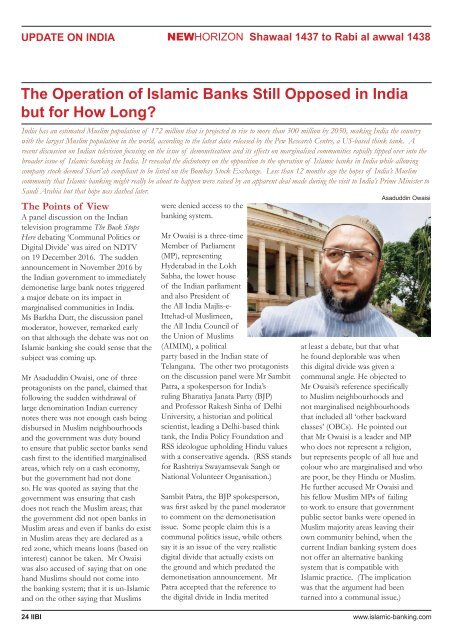NH-2016-q2
You also want an ePaper? Increase the reach of your titles
YUMPU automatically turns print PDFs into web optimized ePapers that Google loves.
UPDATE ON INDIA<br />
NEWHORIZON Shawaal 1437 to Rabi al awwal 1438<br />
The Operation of Islamic Banks Still Opposed in India<br />
but for How Long?<br />
India has an estimated Muslim population of 172 million that is projected to rise to more than 300 million by 2050, making India the country<br />
with the largest Muslim population in the world, according to the latest data released by the Pew Research Centre, a US-based think tank. A<br />
recent discussion on Indian television focusing on the issue of demonetisation and its effects on marginalised communities rapidly tipped over into the<br />
broader issue of Islamic banking in India. It revealed the dichotomy on the opposition to the operation of Islamic banks in India while allowing<br />
company stock deemed Shari’ah compliant to be listed on the Bombay Stock Exchange. Less than 12 months ago the hopes of India’s Muslim<br />
community that Islamic banking might really be about to happen were raised by an apparent deal made during the visit to India’s Prime Minister to<br />
Saudi Arabia but that hope was dashed later.<br />
The Points of View<br />
A panel discussion on the Indian<br />
television programme The Buck Stops<br />
Here debating ‘Communal Politics or<br />
Digital Divide’ was aired on NDTV<br />
on 19 December <strong>2016</strong>. The sudden<br />
announcement in November <strong>2016</strong> by<br />
the Indian government to immediately<br />
demonetise large bank notes triggered<br />
a major debate on its impact in<br />
marginalised communities in India.<br />
Ms Barkha Dutt, the discussion panel<br />
moderator, however, remarked early<br />
on that although the debate was not on<br />
Islamic banking she could sense that the<br />
subject was coming up.<br />
Mr Asaduddin Owaisi, one of three<br />
protagonists on the panel, claimed that<br />
following the sudden withdrawal of<br />
large denomination Indian currency<br />
notes there was not enough cash being<br />
disbursed in Muslim neighbourhoods<br />
and the government was duty bound<br />
to ensure that public sector banks send<br />
cash first to the identified marginalised<br />
areas, which rely on a cash economy,<br />
but the government had not done<br />
so. He was quoted as saying that the<br />
government was ensuring that cash<br />
does not reach the Muslim areas; that<br />
the government did not open banks in<br />
Muslim areas and even if banks do exist<br />
in Muslim areas they are declared as a<br />
red zone, which means loans (based on<br />
interest) cannot be taken. Mr Owaisi<br />
was also accused of saying that on one<br />
hand Muslims should not come into<br />
the banking system; that it is un-Islamic<br />
and on the other saying that Muslims<br />
were denied access to the<br />
banking system.<br />
Mr Owaisi is a three-time<br />
Member of Parliament<br />
(MP), representing<br />
Hyderabad in the Lokh<br />
Sabha, the lower house<br />
of the Indian parliament<br />
and also President of<br />
the All India Majlis-e-<br />
Ittehad-ul Muslimeen,<br />
the All India Council of<br />
the Union of Muslims<br />
(AIMIM), a political<br />
party based in the Indian state of<br />
Telangana. The other two protagonists<br />
on the discussion panel were Mr Sambit<br />
Patra, a spokesperson for India’s<br />
ruling Bharatiya Janata Party (BJP)<br />
and Professor Rakesh Sinha of Delhi<br />
University, a historian and political<br />
scientist, leading a Delhi-based think<br />
tank, the India Policy Foundation and<br />
RSS ideologue upholding Hindu values<br />
with a conservative agenda. (RSS stands<br />
for Rashtriya Swayamsevak Sangh or<br />
National Volunteer Organisation.)<br />
Sambit Patra, the BJP spokesperson,<br />
was first asked by the panel moderator<br />
to comment on the demonetisation<br />
issue. Some people claim this is a<br />
communal politics issue, while others<br />
say it is an issue of the very realistic<br />
digital divide that actually exists on<br />
the ground and which predated the<br />
demonetisation announcement. Mr<br />
Patra accepted that the reference to<br />
the digital divide in India merited<br />
Asaduddin Owaisi<br />
at least a debate, but that what<br />
he found deplorable was when<br />
this digital divide was given a<br />
communal angle. He objected to<br />
Mr Owaisi’s reference specifically<br />
to Muslim neighbourhoods and<br />
not marginalised neighbourhoods<br />
that included all ‘other backward<br />
classes’ (OBCs). He pointed out<br />
that Mr Owaisi is a leader and MP<br />
who does not represent a religion,<br />
but represents people of all hue and<br />
colour who are marginalised and who<br />
are poor, be they Hindu or Muslim.<br />
He further accused Mr Owaisi and<br />
his fellow Muslim MPs of failing<br />
to work to ensure that government<br />
public sector banks were opened in<br />
Muslim majority areas leaving their<br />
own community behind, when the<br />
current Indian banking system does<br />
not offer an alternative banking<br />
system that is compatible with<br />
Islamic practice. (The implication<br />
was that the argument had been<br />
turned into a communal issue.)<br />
24 IIBI<br />
www.islamic-banking.com


